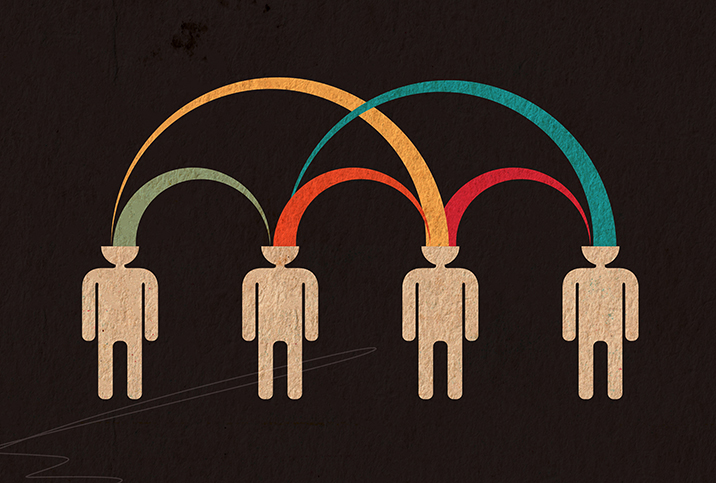That's Too Much Information: TMI and Dating

There's a scene in 2001's "Shrek" where the titular character and Donkey are walking through a field. "There's a lot more to ogres than people think," Shrek says. "Ogres are like onions. Onions have layers. Ogres have layers."
In a new relationship, you probably want to be a bit like Shrek: not exactly emulating the smelly, social outcast side of his character, but to remain somewhat mysterious. You may opt to be someone who slowly reveals the layers of yourself and your past relationships, keeping your partner wondering what else is beneath the surface.
Though not the sexiest metaphor, being similar to Shrek can keep you from saying too much too soon, thus, potentially scaring off a great partner. From sexual experiences to various exes, you should tread carefully when you begin sharing aspects of your past.
There's a reason "too much information" has such a popular acronym: TMI.
The following five common conversation threads will likely come up. Experts have advice on how to navigate them.
1. How many people have you slept with?
Sharing your body count with your new partner is one layer of yourself you may never want to reveal. It's basically a lose-lose situation. You never know what someone considers too many or too few when it comes to the number of sexual partners. People are not like cars; there's no standard mileage per year.
Say a low number and you may appear pitifully inexperienced, possibly making your partner doubt if you can please them. But if your estimate sounds too high, your partner may start to fear they're inadequate.
The actual number likely should remain between you and your diary.
"When you're getting to know someone new, represent yourself as if you are a high-end brand," said Amber Lee, a relationship expert and co-founder of Select Date Society, which serves areas across the United States. "Sharing how many people you've slept with can cheapen your overall appearance."
2. What are your best and worst sexual experiences?
You should absolutely talk about sexual experiences, but do so delicately and sensitively. As long as you do, sharing past romps can be a fun way to learn about each other's turn-ons, turnoffs and fantasies.
The trick is not to focus on the who but rather the what in your past sexual experiences, suggested Rebecca Rose Vassy, a sex educator and relationship coach at the Pincus Center for Inclusive Treatment and Education in the Washington, D.C. area.
"If you're rhapsodizing about a lover's big penis, your current partner may begin wondering if they're big enough for you," she said. "I would focus on talking about what made those experiences bad or good. Was it where you were being touched? What they were doing to you? Was it something you felt pressured to try? How did it make you feel?"
No one wants to feel self-conscious, but everyone wants to have better sex. Sharing what you liked and didn't like from your past can be a great intimacy booster and get you closer to what you really want from a lover.
3. What were your exes like?
Similar to discussing past sexual experiences and partners, recalling your exes inevitably leads to comparisons, so keep it short and sweet if your new fling asks about them.
"There is no need to disclose all the dirty details of your past relationships," Lee said. "The reason your last relationship ended has nothing to do with the person in front of you. If your date asks why your last relationship ended, simply say, 'It just wasn't the right fit,' and keep the conversation moving forward."
She suggested you can even turn the conversation flirty by saying something along the lines of, "I'm glad it didn't work out because now I get to sit in front of this gorgeous person and have a great time."
At the end of the day, your current partner just wants to feel secure being with you.
4. Have you ever cheated?
We've all had our fair share of cheating or being cheated on—everybody makes mistakes. Would you really want to know all your partner's dirty laundry? If not, why share your own?
Some secrets are better left buried, said Treva Brandon Scharf, of Los Angeles, a life, dating and relationship coach certified by the International Coaching Federation (ICF).
"If it doesn't serve a purpose to tell your current partner, then consider it too much information," she said. "Unless it's pertinent to your life story or you need to unburden yourself of it for some reason, it's better to keep it to yourself."
5. Sharing trauma from your past
Trauma is one of the innermost layers of a person and shouldn't be talked about lightly. The answer to when or if you should disclose a traumatic incident is a big "it depends" based on the type of trauma and how it affects you in the present day.
"Disclosing trauma really depends on how comfortable you are talking about it and whether the person needs this information to make you feel safe," said Nick Bognar, L.M.F.T., a clinician in California who specializes in couples therapy, trauma, men's mental health and codependency. "I would recommend talking to a trauma therapist to discuss approaches and make a plan for how to navigate these situations on dates. These circumstances are far too high-stakes and individualized for me to give general advice."
Whatever the question, the answer depends
How much should you share about your past? It depends on the areas of your life that you're talking about and how far along you are in the relationship. But Lee offered a general rule.
"Don't use your dates as a therapy session where you unpack all of your emotional baggage," Lee said.
It may be tempting to tell all in an attempt to establish emotional intimacy, but save TMI for your best friends or professionals. Once you see your partner as a good friend, you can have greater transparency and honesty. But in the initial dating stages, you're better off embracing your mysterious inner Shrek and peeling back your past one careful layer at a time—like an onion.




















